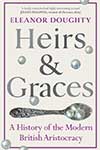|
HEIRS AND GRACES
A History of the Modern British Aristocracy
By Eleanor Doughty

|
The aristocracy has historically given many of its sons in service to the Household Division. Many of them would argue that their experience as a soldier was a blessing and would echo the words of the late Lord Rothermere: 'I found it extremely helpful in understanding the true nature of society. It gave me quite an idea about what the real world is like for the majority of people’. You don't have to be an heir to a title to agree with Rothermere's sentiment. Army service has always been an eye opener, whether you join as a guardsman or as an officer, and for many a wonderful catalyst for social mobility.
This is one of those books that gives hours of pleasurable reading, a book for the bedside which you can dip into for an entertaining anecdote, or just a glance at the appendix which lays out the current hereditary peerage. I found myself ferreting down the list from Dukes to Barons to find out who holds the oldest title, a close-run thing between the Earl of Sutherland (1235) and Baron Mowbray, Segrave and Stourton (1283). It is also a beautifully researched work by a gifted former Daily Telegraph journalist whose book you can read on many levels.
It's also a wonderful piece of social history charting the importance of the aristocracy in Britain's political fortunes to its position today as a disparate collection of individuals who, by and large, have to earning a living. Many remain great landowners and take their responsibilities as custodians of our countryside with foresight and imagination. I happen to live in West Sussex, dominated by the great estates of Goodwood, Cowdray, Petworth and Arundel. In contrast, East Sussex has been steadily ruined by rapacious property developers with little thought given to the environment or building sustainable communities.
It's strange how any book on Britain's aristocracy starts with the rise and fall of the Fitzwilliam family and their magnificent house, Wentworth Woodhouse, brought low by the Labour secretary for mines, Manny Shinwell, who allowed open-cast mining to take place close to the house. It was pure vindictiveness. The Fitzwilliam earls have passed into history, but many of their estates remain in good hands, notably Milton Hall near Peterborough, inherited through the maternal line by a former Life Guards officer, Sir Philip Naylor-Leyland Bt.
Any history of this nature relies on primary sources, access to family archives and earning the trust of people you interview. This is one of the book's great strengths and the reader feels that the author has ushered them in to have an intimate glimpse of the trials and tribulations of some of the great aristocratic families. Of course, with devilish death duties and the Inland Revenue snapping away, the aristocracy has had to employ the best of tax and family lawyers. Bend'Or, Duke of Westminster, died in 1953 accruing some £20 million in death duties (£713.6m today). An entire department of the Revenue was earmarked to deal with his estate. The author does not confirm, however, that Westminster's lawyers argued that his death had resulted from war wounds - he served in the Royal Horse Guards Egypt in the Great War - in which case no tax was payable. His heirs still had to pay over £600m in duties although the Revenue were gracious enough to give the family 11 years to pay it off, easily within the estate's grasp with their huge land holdings in London and the UK.
Like Tolstoy's immortal first sentence in Anna Karenina, ‘All happy families are alike; each unhappy family is unhappy in its own way’, the aristocracy has had its fair share of worthless characters and sorrowful times. The story of John Jermyn, heir to the Marquessate of Bristol and the Ickworth Place estates in Suffolk is one of the more salutary tales. The author looks at Jermyn's decline and early death in a sympathetic way. It's wrong to say families have bad blood in their genes but heirs can certainly suffer from a cold and loveless upbringing. This can often bring on a sense of entitlement and ruinous behaviour as a cloak against parental neglect.
The author examines the principle of primogeniture, the passing of title and estates to the eldest son, a tradition which has its advocates but is unlikely to remain much longer. We will never adopt the French law which dictates that an estate is divided equally between the children but there is no reason why the eldest daughter should not inherit. I remember a former Scots Guards officer telling me that, when his father died and his elder brother inherited the family estates, he was left less money than the gardener.
We no longer create hereditary peers; the last one was Harold Macmillan as Earl of Stockton. They are a spent force in the House of Lords. But perhaps we can shout Olé! for the King of Spain who bestowed in June this year the title of Marquis of Llevant de Mallorca on Rafael Nadal for 22 Grand Slams.
Paul de Zulueta
Published by Hutchinson Heinemann |
|

